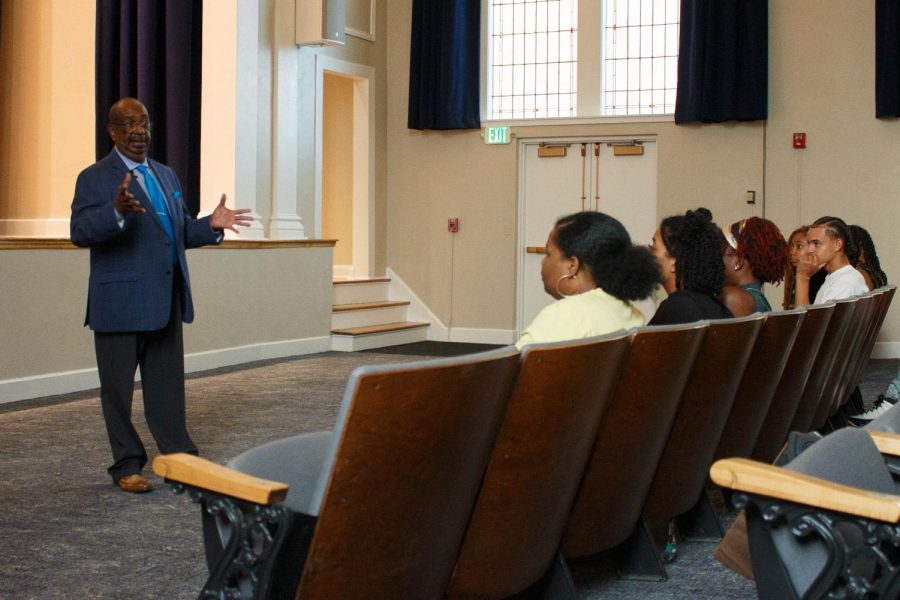Freedom Rider shares experience with students
Hezekiah Watkins talks to students about his experience as the youngest Freedom Rider during the 1960s (Dionte Berry/The News).
April 27, 2023
The youngest Freedom Rider in U.S. history spoke about his journey from death row at 13 years old to civil rights activist at the Wrather West Kentucky Museum on Thursday, April 20.
The Freedom Riders were civil rights activists in the 1960s who challenged segregation by riding interstate buses in interracial groups all over the southern United States.
Hezekiah Watkins, 75, was arrested 109 times during his years as a Freedom Rider—more than any other Freedom Rider.
Watkins said he was first introduced to the Freedom Riders at 13 years old while watching the news. He saw coverage where law enforcement abused white and Black people alike during civil rights protests in Birmingham, Alabama.
“I saw individuals being beaten, kicked, spat on, watered down with hoses,” Watkins said. “I just looked at it amazed. I’m thinking it’s a continuation of a movie segment, but it was news that was happening.”
Watkins said he became curious about the Freedom Riders, so he asked his mom who they were.
His mom told him never to use the word “Freedom Rider” again.
Watkins instead asked his science teacher, who he thought would be honest about the Freedom Riders.
“He looked me dead in my eye,” Watkins said. “‘Get the h*** out of here, boy.’ He said, ‘You must want me to lose my job.’”
Watkins said his friend told him the Freedom Riders were coming to Jackson, Mississippi, where the two lived. They then started to think of a plan to sneak out and see them.
Attempting to trick his mother, Watkins decided to fake an illness and sneak out of the house with his friend. When they reached the bus station, his friend made him go first.
“After being pushed inside, I saw the sign,” he sighed. “It read, ‘whites only.’”
On July 7, 1961, Watkins was arrested at the bus station and taken to the Mississippi State Penitentiary, also known as Parchman Farm, in Sunflower County, Mississippi.
“During this time, it was the most notorious prison in these United States,” Watkins said
While in prison, he had a conversation with two inmates who told him he was on death row.
Watkins was on death row for nine days before being released and taken back to his family in Jackson.
He claimed his mother cried tears of joy when she saw him. He remembers she held him close all the way from the police station to their home. But the joy was followed by punishment.
“My mother beat the stuffing out of me,” Watkins said. “I was locked up in the house until August when school started.”
At school, he ran into James Bevel, a civil rights activist who wanted to recruit Watkins to become a Freedom Rider.
“I showed him my scars and said, ‘Do you think I want to go through this again?’” Watkins said.
Watkins was eventually persuaded to join the Freedom Riders and became the youngest Freedom Rider in the U.S.
His mother came around and gave him her blessing.
He said the new generation needs to pick up where he left off to create change in the world.
“I’m proud to have been a Freedom Rider, and it’s time for me to pass the torch,” Watkins said.
He said the only way to move forward is to vote for qualified candidates in government positions.
“We can’t vote for our friends anymore,” Watkins said. “That’s what has happened. We have put our friends and relatives in these positions, but now that they are there, they don’t even know you.”
He explained in Mississippi, there are many Black government officials in office, but they don’t agree on what platform to advance.
In order to make change, Watkins said people need to look closely at each candidate instead of picking someone they like as a person.
Watkins currently works with the Civil Rights Museum in Jackson and has published “Pushing Forward,” a memoir detailing his experience as an activist. You can buy the memoir at pushingforwardbook.com.
dcharltonperrin@murraystate.edu




























































































